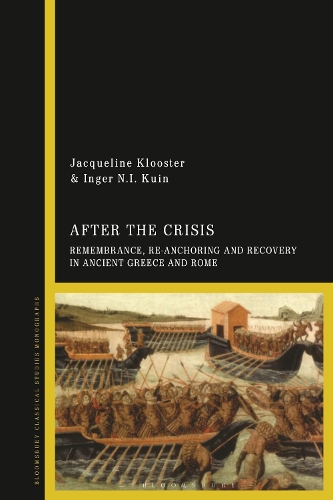
After the Crisis: Remembrance, Re-anchoring and Recovery in Ancient Greece and Rome
(Hardback)
Available Formats
Publishing Details
After the Crisis: Remembrance, Re-anchoring and Recovery in Ancient Greece and Rome
By (Author) Dr Jacqueline Klooster
Edited by Dr Inger N.I. Kuin
Bloomsbury Publishing PLC
Bloomsbury Academic
6th February 2020
United Kingdom
Classifications
Professional and Scholarly
Non Fiction
Military history
Ancient history
303.4840937
Physical Properties
Hardback
280
Width 156mm, Height 234mm
567g
Description
Crises resulting from war or other upheavals turn the lives of individuals upside down, and they can leave marks on a community for many years after the event. This volume aims to explore how such crises were remembered in the ancient world, and how communities reconstituted themselves after a crisis. Can crises serve as catalysts for innovation or change, and how does this work What do crises reveal about the normality against which they are defined and framed People living in post-crisis societies have no choice but to adapt to the changes caused by crisis. Such adaptation entails the question of how the relationship between the pre-crisis situation and the new status quo is constructed, and by whom. Due to the reduced possibility of using the immediate past, which is tainted by conflict and bad memories, it may involve revisions of historical narratives about communal pasts and identities, through the selection of new anchors, and sometimes even a discarding of the old ones. Crises affect all areas of life, and crisis recovery likewise spans different spheres. This volume finds traces of such recovery strategies in texts as well as visual representations; in literary as well as in documentary texts; in official ideology as much as in subaltern responses. The contributors bring together the diverse testimonies for such ways of coping that have survived from antiquity.
Reviews
The volume as a whole came together well and the contributions not only interact with one another, but also individually tend to advance the discussion. As a result it is certain to stimulate further work. This volume elegantly deals with the topic of crisis and its sequel in a coherent and insightful manner that makes it extremely useful for courses and seminars at the graduate and post-graduate level. With its focus on the political and socio-cultural trauma of civil war and conquest, this volume constitutes a significant contribution to trauma and memory studies. * The Journal of Roman Studies *
Crisis, in the everyday political, cultural and social sense by which it is understood by many today, is a modern invention. The choice to utilise such a weighty and irreducible concept to read events of the Classical past is a welcome one, as the ubiquity of trouble and trauma in Greco-Roman history justifies continuous comprehensive attention with a view to understanding pivotal events as public and/or private crises ... Klooster and Kuin, along with their contributors, adopt an appropriately modern approach to the concept. * The Classical Review *
This is a fine volume, well worth reading and as attractive for its insights into ancient communities as it is for the connections it inevitably stimulates with our own contemporary crises. * Classical Journal Online *
The volumes greatest strength is the quality of the individual contributions; every chapter is well-written and cogently argued, and they all make significant interventions in the specific topics they investigate Another major contribution of the volume is that it is one of the opening salvos in what we might call an affective turn in the study of the ancient world. A key theme that many of the chapters touch on is that history functions as a site not just for critical engagement with the past but for emotional engagement with it as well ... To summarize, Klooster and Kuins volume represents an important contribution to the study of classics and ancient history. As mentioned above, many of the individual chapters will become essential works in their particular subfields. * Polis: The Journal for Ancient Greek and Roman Political Thought *
A highly impressive collection of scholarship by leading experts that reminds us in the modern world, that antiquity too was characterised by crises, yet, despite the marks such challenges leave, crises must necessarily pass, communities can recover and they do reconstitute themselves. -- Jason Crowley, Senior Lecturer in Ancient History, Manchester Metropolitan University, UK
Author Bio
Jacqueline Klooster is Assistant Professor of Ancient Greek Literature at the University of Groningen, The Netherlands. Her publications include Poetry as Window and Mirror: Positioning the Poet in Hellenistic Poetry (2011), The Ideologies of Lived Space in Literature, Ancient and Modern (with Jo Heirman, 2013), Homer and the Good Ruler: The Reception of Homeric Epic as Princes Mirror (with B. van den Berg, 2018). Inger N.I. Kuin is Assistant Professor of Classics, General Faculty, at the University of Virginia, USA. Her publications include Strategies of Remembering in Greece under Rome (100 BC100 AD) (with T.M. Dijkstra, M. Moser, and D. Weidgenannt, 2017), as well as several articles on imperial Greek literature and Latin epigraphy.
